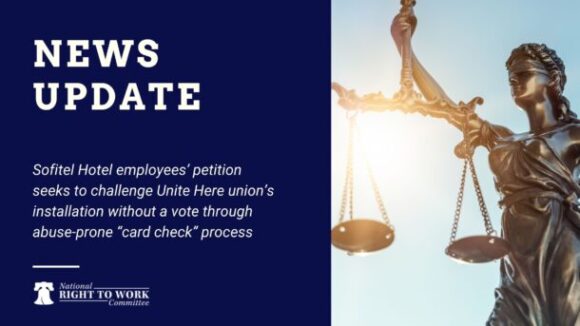Foundation Fires Back Against Biden NLRB ‘Card Check’ Mandate
Brief challenges Labor Board’s attempt to expand coercive, anti-employee organizing scheme
Writing in the Weekly Standard, Stephen Moore details the massive financial obligations and costs imposed on taxpayers by the public employee unions.
It didn’t get much attention on the East Coast, but in late February the town of Vallejo, California, came within an eyelash of becoming the first city since Bridgeport, Connecticut, back in 1991 to declare bankruptcy. This San Francisco Bay suburb of 120,000 residents was threatening to take this radical step because it can no longer afford to pay the extravagant salary and retirement benefits of its public employees. Just a few hours before the city council was to file for bankruptcy, the unions caved in and granted wage concessions to keep the city operational.
Vallejo is not alone.
There are several other cities in California that are contemplating the bankruptcy option thanks to multi-billion-dollar public employee pension and health care obligations that have become effectively unpayable. “Vallejo’s fiscal problems aren’t unique. They’re just the tip of the debt iceberg here in California,” says Keith Richman, a former state legislator and now president of the California Foundation for Fiscal Responsibility (CFFR). The California Public Employees’ Retirement System has $26 billion of unfunded liabilities. The teachers’ retirement system is $20 billion in the red–health benefits add another $48 billion to its shortfall.
Moore called the situation with public employees’ unions the “. . . next great financial bubble in America–a fiscal time bomb that could cause your local and state tax bills to double or even triple in years to come.”
He is right. But this problem is not only on the state level.
Congress has decided to help make the fiscal time bomb even more explosive and powerful. The House of Representatives passed the Police and Firefighter Monopoly Bargaining Act (H.R. 980) which would virtually ensure that Big Labor bosses are granted monopoly bargaining status for local and state police, firefighters, county paramedics, and other public safety officers in all 50 states. (This bill is officially called the Public Safety Employer-Employee Cooperation Act of 2007.)
If you think the problem of public employee unions’ stranglehold on taxpayer funds is bad, wait to see what happens if this bill becomes law.
In the book, Stranglehold, Reed Larson reveals the astonishing story of how organized labor has acquired incredible, hidden power over local, state, and national governments in America. For a free copy of Stranglehold, go here.
Brief challenges Labor Board’s attempt to expand coercive, anti-employee organizing scheme

Josh Hawley distances himself from pro-Right to Work pledges, aligning with union bosses like the Teamsters, despite their history of corruption.

Sofitel Hotel employees’ petition seeks to challenge Unite Here union’s installation without a vote through abuse-prone “card check” process